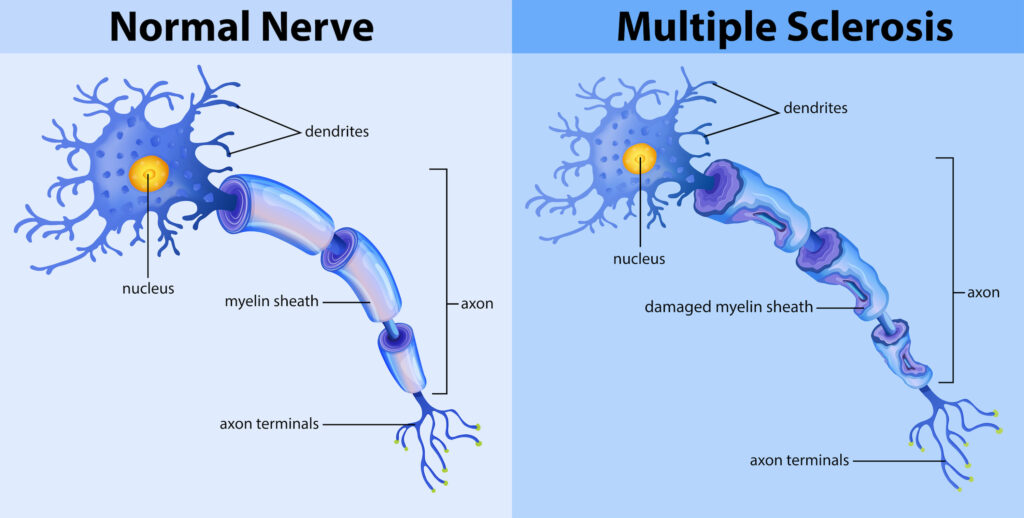
Multiple sclerosis (MS) is an autoimmune condition of the central nervous system that affects approximately 400,000 adults in the United States. MS is three times more common among females than males, and the condition typically begins before age 40.
See, most neurons — brain/nerve cells — have one axon that extends from their bodies. Axons send out electrochemical signals, allowing neurons to communicate. Larger axons are covered in myelin sheaths, which facilitate quicker and more efficient transmission of electrochemical messages.
But in MS, axons become demyelinated, causing the loss of proper nerve transmission. Chronic inflammation, demyelination, and neuronal loss are hallmark traits of MS. Axons in the brain, spinal cord, and optic nerve are those most commonly affected by the condition.

The demyelination of these axons can cause an array of symptoms, including vision disturbances, vertigo, slurred speech, difficulty swallowing, weakness, tremors, fatigue, brain fog, and loss of sensation, among others.
There are also seven different categories of MS, ranging from relapsing-remitting and benign to primary progressive. Seventy to eighty percent of patients have relapsing-remitting MS, though about 15 to 20 percent have the primary progressive type. Individuals with primary progressive MS experience gradual deterioration from the onset of their condition with no relapses.
Many patients with MS throughout the United States currently use cannabis products to help alleviate their symptoms. Additionally, a plethora of clinical studies, reviews, and systematic reviews on cannabis and MS patients have been published over the last several decades.
So what’s the verdict? Does cannabis help with MS?
Cannabis Use with MS
In a survey of over 5,000 patients with MS in North America, 25.5% said they had used cannabis to treat their symptoms; 16% said they currently use cannabis, and 53% said they were considering using cannabis.
“Over 90 percent of respondents thought that access to marijuana should be legalized for MS, and it was perceived as effective for a broad range of symptoms,” the survey states.
Specifically, the respondents who used cannabis said it was most effective at alleviating the following symptoms:
- Muscle spasms, cramps, and spasticity:
- Females: 82.6%
- Males: 79.2%
- Pain and numbness:
- Females: 70.9%
- Males: 68.4%
- Insomnia:
- Females: 64.3%
- Males: 68.5%
- Tremors:
- Females: 61.9%
- Males: 63.7%
- Nausea & gastrointestinal issues:
- Females: 63.9%
- Males: 63.5%
- Migraines & headaches:
- Females: 53%
- Males: 59.5%
- Overactive bladder & bladder spasms:
- Females: 29.6%
- Males: 30.4%
- Anxiety:
- Females: 27.4%
- Males: 26.6%
There have also been clinical trials on patients with MS using cannabis extracts, smoking cannabis, and using a cannabis oromucosal spray. An oromucosal spray is a way of delivering cannabis extracts through a medicinal mouth spray.
Starting with the clinical trial on MS and cannabis extracts, 143 patients received the extract, while 134 received a placebo. They were then asked how the extract (or the placebo) affected their muscle stiffness, body pain, spasms, and sleep quality. Data was collected at the study’s 4, 8, and 12 week points.
By the 4th week of the study, double the number of participants who had received the cannabis extract experienced relief from muscle stiffness, body pain, muscle spasms, and sleep disturbances than those in the placebo group (40 to 60% of those who received the extract vs. 20 to 26% of those in the placebo group).
These results stayed fairly consistent at the 8 and 12 week data collection points. However, improvements in sleep quality decreased from 60% to 48% by week 12. This means that some of the study participants did not experience the same sleep-aid effects from the extract by the end of the trial.
As for smoking cannabis, 30 participants with MS were randomized during a trial. In other words, some participants received a “cannabis cigarette” with 4% Δ9-THC by weight, while others received an identical placebo “cigarette” that contained no THC. Each participant “completed an average of four puffs per cigarette.”
Then, the researchers assessed the participants’ spasticity (muscle stiffness) using the Ashworth scale. The researchers also measured the participants’ perceived pain levels, scored timed walks, and measured their cognitive performance using the Paced Auditory Serial Addition Test.
For context, the Ashworth scale is a clinical tool used to measure muscle tone. Muscle tone refers to the amount of tension or resistance experienced when moving that muscle. It also refers to the range of movement, speed, and control we have over our muscles.
The Paced Auditory Serial Addition Test is a procedure in which participants listen to a tape that says one digit at a time. The participants must then add each digit to the one previously spoken aloud by the recording.
Smoking cannabis improved the group’s muscle spasticity scores on the Ashworth scale by an average of 2.74 points more than the placebo. This group also reported reductions in pain by an average of 5.28 points more than the placebo group. No differences were observed between the groups’ scores on the timed walk, though the cannabis group did have significantly lower scores on the Paced Auditory Serial Addition Test.
“Smoked cannabis was superior to placebo in symptom and pain reduction in participants with treatment-resistant spasticity,” the study concluded. “Further studies should examine whether different doses can result in similar benefits with less cognitive impairment.”
Lastly, the study on a cannabis oromucosal spray involved 64 participants with MS. 32 participants received a full-spectrum cannabis spray that contained 2.7mg of THC and 2.5mg of CBD. The other participants received a placebo.
Throughout the five-week trial, they were asked to rate their neuropathic pain and sleep disturbances on a scale from 0 to 10 (10 being the worst possible pain & sleep disturbances). Those who had taken the cannabis spray experienced more significant reductions in pain and sleep disturbances than those who used the placebo.
However, those who had used the cannabis spray had higher rates of dizziness, dry mouth, and drowsiness.
Overall, each trial shows that cannabis was more effective at treating various MS symptoms — muscle stiffness, spasticity, pain, and sleep disturbances — than the placebo.
CBD Use with MS
Although much of the research on cannabis and MS has entailed high-THC cannabis, there has been some recent research on using CBD to treat MS.
As explained in a review by Furgiuele et al., most of these studies on CBD have been conducted on rodent models of MS. Some studies have administered CBD to these mice orally, intranasally, or as a topical cream to their lower limbs.
Although there was some variability to the study designs, “treatment with CBD was consistently effective,” the review says. Specifically, treatment with CBD lead to delayed symptom onset and reduced disease progression.
These studies also reported improvements to several biomarkers of MS, including reduced neuroinflammation and decreased demyelination. Furthermore, these studies say the mechanisms behind CBD’s efficacy are likely due to how it decreases proinflammatory cytokines and increases anti-inflammatory cytokines. The studies also highlight CBD’s immunosuppressive effects as helping improve MS in these rodent studies.
Overall, the results of these trials are promising. However, they also need to be replicated in human participants to better understand the efficacy of CBD extracts and isolates for treating MS in humans.
Key Takeaways: Cannabis May Help Reduce Symptoms of MS

MS is an autoimmune disorder that leads to loss of nerve transmission. As a result of axon demyelination, patients with MS may experience vision disturbances, mobility issues, tremors, fatigue, and brain fog, among other symptoms. Chronic pain and sleep disturbances are also common with MS.
Several clinical studies on medical cannabis and MS have been published. These studies have administered cannabis extracts, “cannabis cigarettes,” and cannabis oromucosal sprays to participants and measured how it affects their symptoms.
There have also been pre-clinical studies using rodent models of MS to gauge how CBD may impact symptomatology and disease progression.
These studies have demonstrated that cannabis and CBD may effectively alleviate the muscle stiffness, spasticity, chronic pain, and sleep disturbances associated with MS.
While more research is needed to determine which strains and products are most effective at alleviating MS symptoms, the results thus far have been overwhelmingly positive. It’s also worth pointing out that, compared to studies on cannabis and other chronic health conditions, a lot of research specifically focused on MS.
And as with anything in science, the more research and data, the more we can understand and continue to make significant advancements. In the coming years, continued research could help experts determine the best ways to treat MS with cannabis.
References
- Dawood, T., Ehsan, M., & Xisis, K. L. (2022, April 9). Multiple Sclerosis. StatPearls. https://www.ncbi.nlm.nih.gov/books/NBK499849/
- Moini, J. (2019). Anatomy and Physiology for Health Professionals (3rd ed.). Jones & Bartlett Learning.
- Cofield, S. S., Salter, A., Tyry, T., Crowe, C., Cutter, G. R., Fox, R. J., & Marrie, R. A. (2017). Perspectives on marijuana use and effectiveness. Neurology: Clinical Practice, 7(4), 333–343. https://doi.org/10.1212/cpj.0000000000000383
- Zajicek, J. P., Hobart, J. C., Slade, A., Barnes, D., & Mattison, P. G. (2012). MUltiple Sclerosis and Extract of Cannabis: results of the MUSEC trial. Journal of Neurology, Neurosurgery & Psychiatry, 83(11), 1125–1132. https://doi.org/10.1136/jnnp-2012-302468
- Corey-Bloom, J., Wolfson, T., Gamst, A., Jin, S., Marcotte, T. D., Bentley, H., & Gouaux, B. (2012). Smoked cannabis for spasticity in multiple sclerosis: a randomized, placebo-controlled trial. Canadian Medical Association Journal, 184(10), 1143–1150. https://doi.org/10.1503/cmaj.110837
- Rog, D. J., Nurmikko, T. J., Friede, T., & Young, C. A. (2005). Randomized, controlled trial of cannabis-based medicine in central pain in multiple sclerosis. Neurology, 65(6), 812–819. https://doi.org/10.1212/01.wnl.0000176753.45410.8b
- Furgiuele, A., Cosentino, M., Ferrari, M., & Marino, F. (2021). Immunomodulatory Potential of Cannabidiol in Multiple Sclerosis: a Systematic Review. Journal of Neuroimmune Pharmacology, 16(2), 251–269. https://doi.org/10.1007/s11481-021-09982-7